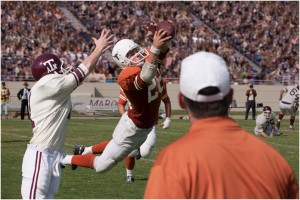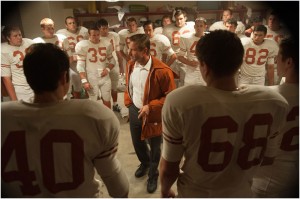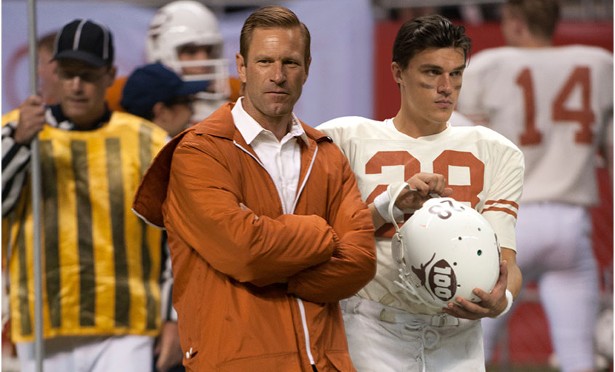I’ve been at this point before–where I’m convinced the entertainment industry is incapable of producing any movie other than formulaic pap, recycled vehicles from decades past, chick-flicks (overt or disguised) or “social justice” agitprop. Then I stumble across something like My All-American, and am amazed that something worth watching can still slip through the cracks.
There are only so many plot variations to be utilized in a jock story, so, granted: one can argue that this film should be included in the “formulaic pap” comment I made above. In fact, you might note many similarities between this movie and Rudy and The Express (or, going back farther, to Brian’s Song, or, changing sports, The Natural). Nevertheless, this biopic should be celebrated by red pill masculists everywhere–especially those raising a son, yearning for something worth watching together.
My All-American tells the story of Freddy Steinmark, who was born to play football. Gifted with natural athletic ability, his fat her, while working two jobs to support the family, pushed Freddy to relentlessly expand on his talent with rigorous conditioning. His mother (a stay-at-home mom, it seems) was on-board with her son’s disciplined upbringing, complimenting her husband’s stern agenda with loving encouragement.
her, while working two jobs to support the family, pushed Freddy to relentlessly expand on his talent with rigorous conditioning. His mother (a stay-at-home mom, it seems) was on-board with her son’s disciplined upbringing, complimenting her husband’s stern agenda with loving encouragement.
That family dynamic may not have been so unusual in the stories of yesteryear, but it is downright alien in the reality of America today.
Not only is the home life of Steinmark idiosyncratic in our present cultural context, but Freddy himself was exceptional, in any time and place. He is the model of what a young man should be–and what most parents would once have aspired to raise. To list his positive qualities would make this post too long, but I’ll list three that would seem to be diametrically opposed in any other film coming out of Homowood, Commiefornia. He is:
- Forthright
- Humble
- Thoroughly masculine
Ah, crap, I have to list a couple more. The Freddy Steinmark of this film shows the guts, determination and toughness that once exemplified the average American male. Considered too small for most college football programs to take him seriously, there is no “quit” in him, and he fights an uphill battle toward a full-ride scholarship with the Texas Longhorns. I should mention here that other players on the team, and the coach, are developed just enough to make me want to read the book for more details. Despite Steinmark being a terror at defensive back, the team was a team, not a one-man-show. I’m thankful for the authenticy of the film’s depiction of how a football team works (or can work, anyway) from the inside.
One very interesting subplot depicts the starting quarterback–a phenomenal player with a cannon arm–losing his position to a fourth-stringer with better instincts for reading opposing defenses, and who more readily adapts to the coach’s new “triple option” offensive scheme.
Though he is a devout Catholic, Steinmark’s portrayal (by Finn Wittrock) is a case study in Christian integrity–not the wussified churchianity so en vogue on both sides of the pulpit in pretty much every denomination today. Even the leading lady’s (Sarah Bolger) portrayal is a departure from the obligatory grrrrl power! cliche`s rammed down our collective throats everywhere else. The only time she gets “assertive” with boyfriend Freddy, it is due to genuine concern over his well-being. (Director Angelo Pizzo, however, does overdo it trying to milk our emotions in a few smarmy scenes no doubt included to appeal to the females in the audience.)
I’m not sure how faithful the movie is to the true story of Freddy Steinmark, though it does ring true. In any case, you won’t find many movies made since the early 1960s or so which present unabashed manhood in such a positive light.


